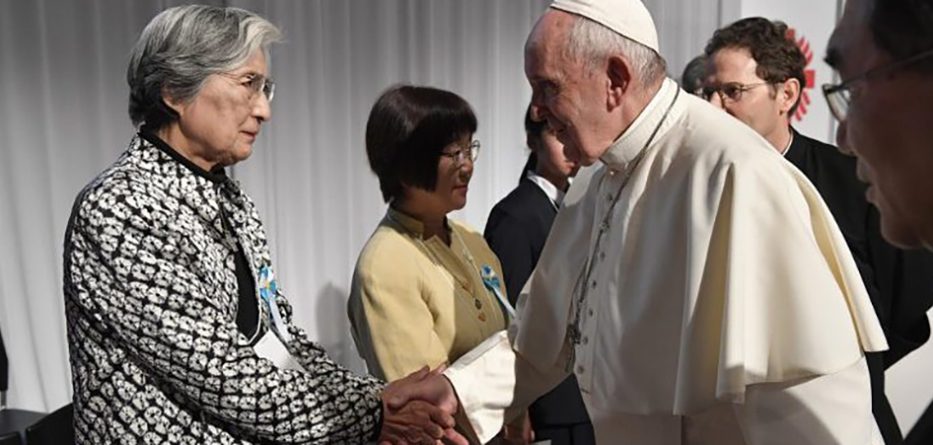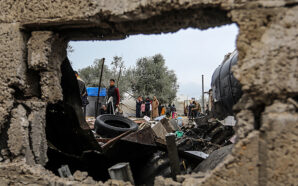During a jam-packed final day in Japan, Pope Francis met with victims of the “triple disaster” that struck Fukushima in 2011, spoke with young people, met with Emperor Naruhito, spoke with civil leaders and met with students at two different schools.
Pope to victims of Japan’s “triple disaster”: We are part of one another
On Monday 25 November, Pope Francis met with victims of the earthquake, tsunami, and nuclear accident that struck the Japanese city of Fukushima in 2011.
After hearing the testimony of survivors, Pope Francis thanked them for expressing their “sorrow and pain,” but also their “hope for a better future.”
He asked for a moment of silence at the beginning of his address, “so that our first word will be one of prayer” for those who died, for their families, and for those still missing. “May this prayer unite us and give us courage to look forward with hope.”
He emphasised the need for the most basic necessities, including food, clothing, and shelter. This, he said, “calls for experiencing the solidarity and support of a community. No one ‘rebuilds’ by him or herself; nobody can start over alone.”
After praising Japan for showing “how a people can unite in solidarity, patience, perseverance, and resilience,” he invited his listeners “to move forward each day, little by little, to build a future based on solidarity and commitment to one another.”
Pope Francis responded to a question from a survivor about how to respond to major issues such as war, refugees, food, economic disparities, and environmental challenges, saying we cannot confront these issues separately.
We must recognise that these challenges are interconnected. But, he said, “the most important thing…is to progress in building a culture capable of combating indifference.” He said “we need to work together to foster awareness that if one member of our family suffers, we all suffer. Real interconnectedness will not come about unless we cultivate the wisdom of togetherness.”
Reflecting especially on the accident at the nuclear power plant in Fukushima, Pope Francis said that in addition to scientific and medical concerns, “there is also the immense challenge of restoring the fabric of society.” This, he said, raises the issue of concerns about the continued use of nuclear power; and he noted the Japanese Bishops call for the abolition of nuclear power plants.
In thinking about “the future of our common home,” he said, “we need to realise that we cannot make purely selfish decisions, and that we have a great responsibility to future decisions.” The testimonies of each of the survivors, he said, remind us of the need to find a new path for the future, a path rooted in respect for each person and for the natural world.”
Pope Francis meets with Japan’s Emperor Naruhito
Following his meeting with victims of the earthquake, tsunami and nuclear accident, Pope Francis had a private meeting with the Emperor of Japan, Naruhito, at the Tokyo Imperial Palace.
The private meeting at the Imperial Palace lasted around 30 minutes.
Pope Francis gave Emperor Naruhito a mosaic of the “View of the Arch of Titus”, based on a watercolour painting by the Roman artist Filippo Anivitti (1876-1955).
Japanese media made note of how the Emperor accompanied Pope Francis to his car. Usually guests depart with their retinue, while the Emperor remains inside.
Analysts say this is a sign of the special regard in which he holds Pope Francis.
After the brief meeting, the Pope travelled to Tokyo’s St Mary Cathedral to meet with young people.
Pope to young people in Tokyo: ‘Japan needs you, the world needs you!’
The meeting between Pope Francis and young people in Tokyo’s St Mary Cathedral began with some first-hand testimonies. Representing the cultural and religious diversity of young people living in Japan today, a young Catholic, a young Buddhist, and a young migrant were able to voice their deepest fears and aspirations and ask the Pope some important questions.
Bullying, he said, “attacks our self-confidence at the very time when we most need the ability to accept ourselves and to confront new challenges in life.”
The Pope described the phenomenon as an epidemic and said the best way to treat it is to unite and learn to say “Enough!”. And he urged all young people never to be afraid of “standing up in the midst of classmates and friends and saying: “What you are doing is wrong.”
Fear, the Pope explained, is always the enemy of goodness, because it is the enemy of love and peace.
He said that all great religions teach tolerance, harmony and mercy, not fear, division and conflict. He reminded those present that Jesus constantly told his followers not to be afraid. Love for God and for our brothers and sisters, the Pope said, casts away fear. “Jesus himself,” he said, “knew what it was to be despised and rejected – even to the point of being crucified.”
“He knew too what it was to be a stranger, a migrant, someone who was “different.” In a sense, Jesus was the ultimate “outsider,” an outsider who was full of life to give,” he said.
“The world needs you, never forget that!” Pope Francis said to all the ‘Leonardo’s of the world’: we can always look at all the things we don’t have, but we must see all the life that we can give and share with others: “The Lord needs you, so that you can encourage all those people around us who are looking for a helping hand to lift them up.”
Remarking on how many people throughout our world are materially rich, but live as slaves to unparalleled loneliness, the Pope quoted Saint Mother Theresa of Calcutta who worked among the poorest of the poor and said: “Loneliness and the feeling of being unloved is the most terrible form of poverty.”
We are all called to combat spiritual poverty, Pope Francis said, but young people have a special role to play “because it demands a major change in priorities and options.”
“It means recognising that the most important thing is not what I have or can acquire, but with whom I can share it. It is not so important to focus on what I live for, but whom I live for. Things are important, but people are essential,” he said.
Without people, the Pope continued, we grow dehumanised, we lose our faces and names, and we become just another object.
Friendship, the Pope said is something beautiful that you can offer to our world, and he invited young people to place their hope in a future “based on the culture of encounter, acceptance, fraternity and respect for the dignity of each person, especially those most in need of love and understanding.”
“In order to stay alive physically, we have to keep breathing; it is something we do without realising it, automatically. To stay alive in the fullest sense of the word, we also need to learn how to breathe spiritually, through prayer and meditation,” he said.
He urged those present to do that and learn to hear God speak to them in the depths of their hearts, and at the same time reach out to others in acts of love and service.
Dear young people, the Pope concluded, “Never lose heart or set aside your dreams. Give them plenty of room, dare to glimpse vast horizons and see what awaits you if you aspire to achieve them together.”
Pope to authorities: your heritage is precious, your morals high
Pope Francis addresses members of civil society and the diplomatic corps, in Japan, and urges them to cherish their precious cultural heritage, maintaining solidarity with all members of our human family.
“As a nation,” the Pope continued, “Japan is particularly sensitive to the suffering of those less fortunate.” On this note, he recalled the theme of his visit: Protect all life, “in the recognition of its inviolable dignity and the importance of showing solidarity and support to our brothers and sisters in any kind of need.”
“We know that, in the end, the civility of every nation or people is measured by the attention it devotes to those in need and its capacity to be fruitful and promote life.”
The Pope then explained that he is not only in Japan to confirm Japanese Christians in their faith, but also “to implore God and invite all persons of good will to encourage and promote every necessary means of dissuasion so that the destruction generated by atomic bombs in Hiroshima and Nagasaki will never take place again in human history.”
He added that history has proven that dialogue is enough to solve conflicts, describing it as “the only weapon worthy of man and capable of ensuring lasting peace.”
Speaking of Japan’s “precious cultural heritage,” Pope Francis pointed out that “throughout many centuries of its history,” Japan has been able to develop and preserve “the profound religious and moral values that characterise this ancient culture.”
Good relations between the different religions are not only essential for a future of peace, he said, but for training present and future generations to cherish the ethical principles that serve as the foundation for a truly just and humane society.
Pope receives Scholas Occurrentes on its launch in Japan
Pope Francis Monday met a delegation of the Scholas Occurentes Foundation as it launched its office in Japan, the first of its kind in Asia.
The Scholas Occurrentes, the Latin for “schools that meet,” is today an educational project of pontifical right launched by Pope Francis in Argentina 2001, when he was Archbishop of Buenos Aires. Its aim is to encourage social integration and the culture of encounter through sports, arts and technology. The Pope made it into a foundation in 2013.
Speaking on behalf of the group, Seiji Tanaka, 18, told the Pope they realised that the purpose of their education was to “create a more just and peaceful world.” Tanaka said that during the Scholas educational experience programme, they discovered that there were “things that cannot be expressed with numbers or logic, and that are in people’s hearts.”
The Holy Father expressed his satisfaction with their testimony, saying they don’t repeat things done by others but prefer to learn with their head and be creative and. “You create things,” the Pope said, “because true wisdom is not only to fill the head with ideas but to express oneself with the three languages: the language of the mind, what I think; the language of the heart, what I feel; and the language of the hands, what I do.”
Pope at Sophia University in Japan: Seek, find, and spread Divine Wisdom
Pope Francis visits Sophia University in Tokyo at the conclusion of his Apostolic Visit to Japan, and affirms that “quality education should not be the privilege of a few.”
Pope Francis addressed students, professors, and staff of the University on Tuesday morning, just prior to his departure for Rome.
“Since universities continue to be the primary place where future leaders are trained,” he continued, “it is necessary that a breadth of knowledge and culture inspire every aspect of the life of educational institutions, making them ever more inclusive and capable of generating opportunities and social advancement.”
Playing on the Greek word “Sophia”, meaning “Wisdom”, the Pope said we have always been in need of true Wisdom “in order to manage our resources in constructive and efficient ways.”
Referring to present-day Japan as a “competitive and technologically oriented” society, he suggested that Sophia University be a centre not only of intellectual formation, “but also of a place where a better society and a more hope-filled future can take shape.”
The universal Church looks “with hope and interest to young people worldwide,” affirmed Pope Francis.
Sophia University should not only offer young people an excellent education, he said, but also allow them to be part of that education: “offering their insights and sharing their vision and hopes for the future.”
Pope Francis stressed how Sophia University’s Christian and humanistic tradition is fully consonant with “walking with the poor and the outcasts of our world.”
Marginalised individuals should be “creatively incorporated into the life and curriculum of the university, in an effort to bring about an educational approach aimed at reducing distances and disconnects,” said the Pope. “Quality university education should not be the privilege of a few, but constantly informed by the effort to serve justice and the common good,” he added.
Pope Francis concluded his address with words of encouragement and challenge: “The Lord and his Church are counting on you to share in the mission of seeking, finding and spreading Divine Wisdom,” he said, “and thus offering joy and hope to present-day society.”
Sources:
Vatican News and Christopher Wells – Pope to victims of Japan’s “triple disaster”: We are part of one another
Vatican News and Davin Watkins – Pope Francis meets with Japan’s Emperor Naruhito
Vatican News and Linda Bordoni – Pope to young people in Tokyo: ‘Japan needs you, the world needs you!’
Vatican News and Francesca Merlo – Pope to authorities: your heritage is precious, your morals high
Vatican News and Robin Gomes – Pope receives Scholas Occurrentes on its launch in Japan
Vatican News – Pope at Sophia University in Japan: Seek, find, and spread Divine Wisdom








